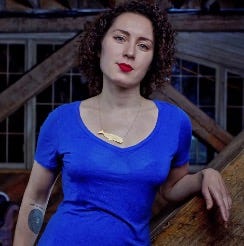News Notebook Friday 8.6.21
A Tapas-Fare Week: Ted's Lasso, Maria's Pickings… Other Moving Stuff
Happy weekend and welcome to some newShrink bites!
This week’s serving evolved out of home-front eldercare/mom transition, too many moveable parts plus household workspaces scrambled by multiple tech snarls. Yet amid all the moving around of people and stuff, some things also are moving (and feeding) me.
Today’s newShrink is about some of them.
First a curiosity: At this time and place in American culture, what is it about this wisely clueless, disruptively kind guy, the “Ted Lasso” character of the eponymous AppleTV+ show, that so hooks, moves—um, lassos—us?
lasso-Ted

If you’re not yet familiar, Ted is an American college-level football coach with no soccer background hired to coach an English Premier League football club. The club was in divorce settlement for boss-owner Rebecca. She’s hired the unprepared Lasso with the covert intent that he ruin it as revenge against her serial-cheater and otherwise obnoxious ex-husband.
The show is nuanced, far more than the sum of its parts. Co-created by Jason Sudeikis playing Ted, its freshman season has won a Peabody Award and is up for a record 20 Emmy nominations. The second season has begun, with new episodes dropping on Fridays.
General-information articles and reviews of the show are available from sources ranging from The New York Times, USA Today and NPR to specialty pieces featuring its food themes—open peanut butter jars and homemade shortbread, for example. A recent interview with Sudeikis on The Late Show with Stephen Colbert, available on You Tube, is insightful and fun.
In an academic take on the show in The Washington Post, Tufts University professor of international politics and law Daniel W. Drezner describes himself as an early cynic who ignored “Ted Lasso” last fall. Finally having sampled it with his COVID-weary family by February, Drezner now calls it an “emotional life raft” that amounts to “human infrastructure:”
“…Ted is not quite what anyone expects… Ted is like a sweet Vidalia onion: Layers of depth with surprising flavors and sensations, and the deeper you look, the more likely you are to cry a little. Here’s one example from Season 1.”
Columnist Alyssa Rosenburg (also in the Post) describes how character Ted provides a needed example and role model.
…”Ted Lasso—both the show and the character—represents something different: a boundless faith that men in general, and in particular the men he coaches, can be ‘the best versions of themselves on and off the field.’
For Ted, that ‘best version’ encompasses both self-confidence and a drive to self-improve; openness that stops short of self-pity; mutual support that’s made possible by deep inner reserves; and a dedication to righting wrongs with a keen sense of how not to foster victimhood. Ted is undeniably masculine, but he regards women and feminine skills with curiosity rather than contempt or confusion.”
Further thoughts from a psychological and soul perspective:
Expanding on Rosenburg’s points, I see Ted as an increasingly conscious, maturing and inspiring model/example of healthy psychological masculinity. (This, by the way, has nothing to do with physiological body parts and is present in both men and women.)
Along with Ted and other male characters, the women like Keeley and even Rebecca are examples of increasingly conscious, healthy maturing psychological (as well as physiological) femininity.
Both are in welcome contrast to the toxic, unconscious forms of each so pervasive across our culture today—again, the psychological masculine and feminine, conscious and unconscious, present in both women and men.
From soul-focused perspective, in psychotherapy we are called to pay attention to what has heart and meaning (in the language of Jungian Angeles Arrien in her indigenous cultures/nature-based model The Fourfold Way.)
In soul-conscious everyday life that just means we stop, notice and attend to things, whatever they are, that move us to tears—whether tears of laughter or sadness, and most particularly when both occur together. This is the “gold” in soul-tracking!
For all his cheerfulness, with Ted Lasso shadow (and grief) is owned, tenderly probed, not denied. His way is neither a stiff-upper-lip nor a sunny-side-up at all costs happy, “choose-positive,” all the time. (This is in contrast to comedy, or our own jokes, that deflect, masking in manic defense against the feeling of difficult feelings that is necessary before we can move through and past them.)
Ted’s is, instead, the kind of humor that opens-us-up, allows tiptoeing into terrain that we’d never otherwise risk treading. We go-there first by trying a joke about it. Many of the show’s encounters of Ted and Keeley with the tough and wounded boss Rebecca illustrate this dynamic.
The show’s sports psychologist, multi-lingual (aptly and comically named!) Dr. Sharon Fieldstone, works wonders with team members and effortlessly uncovers Ted’s blind spots even in their brief casual encounters. Yet for us as viewers, it’s somehow still Ted who’s our shrink, with that opening-shared-insightful-mirror effect on us.
Finally, to me this guy and show arrive with unifying good humor and kindness, like a Mr. Rogers’ Neighborhood for us wearily aging grownups on today’s fiercely divided COVID-era American public stage. As I discovered only long after my too-cool-and-cynical-youth, with his PBS show the late Fred Rogers brought wisdom, compassion and awareness far beyond entertainment to a generation of American children now in middle- and older adulthood. (His Mr. Rogers character and show were deeply grounded in his education and training as a Presbyterian minister, in child psychology and as a pianist-composer.)
Ted Lasso could not be better-timed.
🦋💙
For a different twist on soul-feeding resources, here is someone who’s moved me on many levels since about 2009–another of the “favorite people I have never met” (or in this case, ever contacted directly.)
meet Maria Popova
She’s a Bulgarian-born American, whip-smart U-Penn. alum writer-designer in many venues whose early-adapter blog with the coolest of fun logos grabbed me first with gorgeous, custom artistic design. The experience is described by Anne Marie Slaughter as “like walking into the Museum of Modern Art and having somebody give you a customized, guided tour.” Ever since, Maria Popova holds me with content I can only describe as banquets that cross over and mingle every imaginable discipline, flavor and substance.
I also appreciate her back-story. Pickings reportedly began as regular email to a handful of colleagues back in 2006, when as a new college grad Popova worked in agency advertising. She’d become convinced that drawing from across many fields and disciplines is essential to creative work in any field and critical thinking that’s smart and deep. (This strikes a chord from my years-ago mega-bank corporate communication efforts to similarly infuse and animate our leadership- and motivational communication efforts.) According to Popova’s site she now does brainpickings and a slew of other writing full-time—at volumes more prolific than I can fathom.
Here’s a sample from the lede story in this week’s summary packet of articles from the site:
“Few things limit us more profoundly than our own beliefs about what we deserve, and few things liberate us more powerfully than daring to broaden our locus of possibility and self-permission for happiness. The stories we tell ourselves about what we are worthy or unworthy of—from the small luxuries of naps and watermelon to the grandest luxury of a passionate creative calling or a large and possible love— are the stories that shape our lives.
Bruce Lee knew this when he admonished that “you will never get any more out of life than you expect,” James Baldwin knew it when he admonished that “you’ve got to tell the world how to treat you [because] if the world tells you how you are going to be treated, you are in trouble,” and Viktor Frankl embodied this in his impassioned insistence on saying “yes” to life.
The more vulnerable-making the endeavor, the more reflexive the limitation and the more redemptive the liberation.
Psychologically and from the standpoint of soul the further emphasis here on the bravery inherent in love, both by Popova and in David Whyte’s breathtaking new poem and audio reading, is, like Ted Lasso, welcome counterpoint to today’s pervasive culture. (The words heart and courage share roots with the Latin and old French cour, and words like cross and crux, as well.)
Far more noisy and visible are “reality” TV and caricature via the likes of “Love Island” and “The Bachelor/TheBachelorette;” toxic-unconscious versions of both masculine and feminine ubiquitous in film, TV, literature and social media; and the steady stream of disheartening news on the “Me, Too” front. (Including this week’s latest with New York Governor Andrew Cuomo, see below.)
🦋💙
Looking ahead with return to news-update focus, I’ll aim to unpack and process this scary piece I can’t now unsee: “The Big Money Behind the Big Lie,” from brilliant Jane Mayer of The New Yorker.
(If the paywall keeps you from reading the full piece, political historian Heather Cox Richardson’s Monday, August 2, Letters from an American, browsable at heathercoxrichardson.substack.com, includes this in her daily discussion.)
a p.s. on the “movement” theme…
We know a cultural phenomenon has taken off as a thing when it’s become a movement: civil rights, women’s suffrage, the historic YMCA. More currently: Black Lives Matter, Thin Blue Line… and Me, Too. Which brings me to this week’s disturbing results of thorough, detailed investigation of multiple allegations of sexual harassment in the workplace by New York Governor Andrew Cuomo. This case, and beyond it my complex and quite varied, case-by-case perspectives on the psychological dimensions of Me, Too in general, merit nuanced shrinkwrap piece(s) devoted solely to the topic. I’ll aim to begin that in lieu of a News Notebook one Friday soon, as schedule and bandwidth allow. (With increased mom-priorities and contact it will be fall before I am again able to attempt two posts a week.)
Meanwhile, cartoonist Kevin Siers of The Charlotte Observer provides this summary-closing:
And, that is all I have. Talk to you next week!
🦋💙tish
… it is important that awake people be awake,
or a breaking line may discourage them back to sleep;
the signals we give — yes or no, or maybe —
should be clear: the darkness around us is deep.
— William Stafford, “A Ritual to Read to Each Other”
https://www.washingtonpost.com/outlook/2021/07/28/ted-lasso-is-infrastructure/
https://www.washingtonpost.com/opinions/2021/07/22/thank-god-ted-lasso-man-america-needs-right-now/
https://www.brainpickings.org/about/
http://us2.forward-to-friend.com/forward/preview?u=13eb080d8a315477042e0d5b1&id=29eeec9099
https://www.newyorker.com/magazine/2021/08/09/the-big-money-behind-the-big-lie





